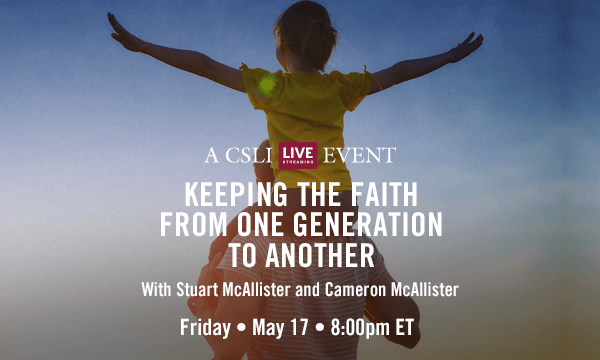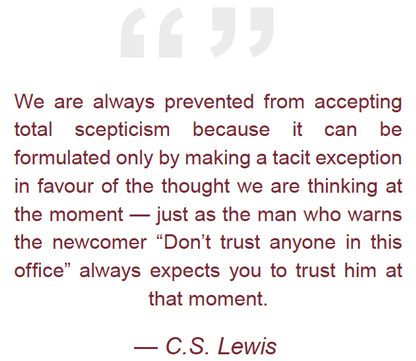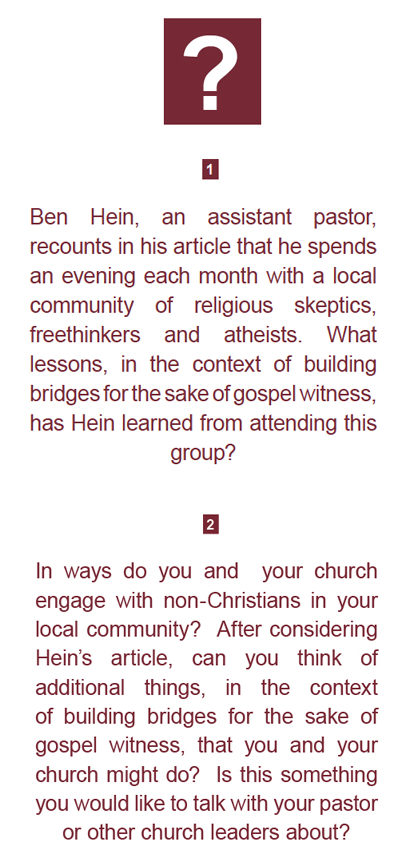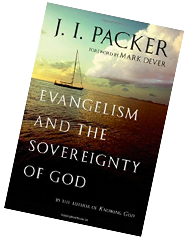Back to series

Recommended Reading:

Speaking To Skeptics
Click here to open a Print - Friendly PDF
About once a month, I gather with a group of wonderful people in the home of a dear friend for a night of great fellowship and conversation. The night generally begins with about an hour of sharing a meal together and catching up. Next we move to the living room for conversation about a topic that is important to all. Before the evening closes, we generally break up into smaller groups, for more personal interactions that allow us to draw closer to one another. Before we leave, we plan our next event — a Saturday brunch, some kind of family-friendly event, or another evening meal and conversation.
If the above description sounds a lot like a church community group — you’d be right! So you may be surprised to learn that this group is a local community of religious skeptics, freethinkers, and atheists. Over the past two years, I have had the privilege of being adopted into this group. I have formed wonderful friendships with some of the most caring people I’ve ever met. As the only Christian in the room at these gatherings, I have learned a lot about building bridges for the sake of gospel witness.
I’d like to share three of the more important lessons that I’ve learned from attending this group. I consider what follows to be “sanctified common sense,” and it is my hope that it will equip you and your church to grow in their engagement with non-Christians.
Know Whom You Are Talking To
If we want to be faithful in communicating the gospel to those who do not share our Christian convictions, we must know whom we are talking to. This is so important because we cannot make the assumption that any two religious skeptics or atheists are the same. To illustrate this point, I give a few examples of the kinds of people I have met. I hope you will see how different evangelism to each of these individuals would look in a one-on-one conversation.
 Jane grew up in a family that rarely went to church — possibly on Easter or Christmas. Jane’s parents wanted their kids to make decisions about faith on their own; their only concern was that their kids would be morally good people. Jane was educated in schools with people from many different religious backgrounds (what Charles Taylor calls the “Nova Effect”).
Jane grew up in a family that rarely went to church — possibly on Easter or Christmas. Jane’s parents wanted their kids to make decisions about faith on their own; their only concern was that their kids would be morally good people. Jane was educated in schools with people from many different religious backgrounds (what Charles Taylor calls the “Nova Effect”).
At the end of the day, she had never been taught any kind of foundation in any one religion, nor had she ever considered why “the big questions” may be important for her to consider. She is not against Christianity, nor is she for it. Jane has no knowledge of the Bible or what happens in a church service on Sunday morning. She does not understand the difference between words like righteousness, and justification, sanctification or narthex and sanctuary. It’s all foreign to her.
Tom grew up in what he considers to be a very “fundamentalist” background. His family went to a large evangelical church that always preached directly from the Bible. As he entered high school, he started meeting friends who didn’t share the evangelical beliefs of his family. This led him to question several things about his faith. After his parents divorced, his dad started treating him poorly. From his perspective, Christianity made no difference in his life or his parents’. By the time he got to college, he was sour about his whole Christian experience and was ready and willing to accept any reason he could find to reject Christianity. In his mind, Christianity was intellectually and personally bankrupt of any real meaning. After meeting some other skeptics in college and reading a few books by prominent atheists, he had altogether rejected the Christianity of his youth.
Aysel is from Turkey and grew up in a strong Muslim culture. She repeatedly saw women being abused and oppressed by men. It was dangerous to even voice opinions that were different from the men in her family or cultural spheres. At the first chance she got, she fled her family and her culture for the United States. She now considers religion to be dangerous not only on a personal but also on a societal level.
How you would respond to each of these individuals? I suggest that these kinds of stories are incredibly common in our contemporary culture, especially among younger people. I hope you’d agree that for each of these three people, there would be a different starting place when trying to bring Christianity to bear on their lives.
 I recently talked with an individual who came from a background similar to Jane’s. After a conversation about the state of health care in our society, he made this insightful comment: “I don’t care about happiness. I care about meaning. I want to know where the greatest meaning for my life can be found.” These kinds of existential needs often can provide great starting places for a gospel conversation. Many people not only crave meaning, but they also desire to know where goodness, beauty, and real love can be found.
I recently talked with an individual who came from a background similar to Jane’s. After a conversation about the state of health care in our society, he made this insightful comment: “I don’t care about happiness. I care about meaning. I want to know where the greatest meaning for my life can be found.” These kinds of existential needs often can provide great starting places for a gospel conversation. Many people not only crave meaning, but they also desire to know where goodness, beauty, and real love can be found.
Here is an example of what this has looked like for me. Each group meeting normally begins by our sharing why we are attending. Many people in these kinds of groups have bought into a narrative that says that mature, thoughtful, and courageous people leave religion behind. So I’d frequently hear stories about leaving behind close-minded religion and becoming more thoughtful about the world.
In light of this, I started introducing myself to the group this way: “Hi, my name is Ben. I’m a Christian, but before you kick me out of the group, I think we have a lot in common! You see, it was my skepticism that led me to Christianity, and I still tend to have a pretty skeptical and curious view of the world. I like to question everything. But, for me, I’ve found that I actually care more about the deep and important questions of life now than I ever did before I was a Christian. That is because the more I know about our universe, the more I will know about the God who created it. So I’m really excited to be in this group, because I know I have a lot more to learn!”
Do you see how I flip the narrative that many of my skeptical friends believe? I suggest that I became more thoughtful and mature in my thinking because of Christianity, not in spite of it. I never grow tired of the confused faces I see from my friends, a face that seems to say, “I can’t compute what you just said.” The idea that religion creates greater thoughtfulness is a new idea for them and has opened up several great conversations about Jesus.
Form Friendships That Are Grounded in Intentional Patience
I originally attended two different skeptic groups. The one I still attend went really well from the very beginning. I had great conversations with the other members. I went to their pool party. I celebrated birthdays with them. The host family always made my favorite appetizer, to make me feel more welcome in the group. Most of them even offered to help me move to Maryland last year when I took a job at a new church.
But things never went well at the second group. People were always on guard around me, they didn’t open up, and it just wasn’t a positive experience. Eventually I decided to stop attending this group, because I was making these folks feel uncomfortable in their own environment.
For a time, I was puzzled. Why had things been going so well at the first group but not the second? Eventually I realized that for several reasons I had been able to form friendships in the first group that I had not been able to form in the second. And these friendships had become bridges to sustain great conversations even amidst deep disagreement.
You see, my friends in this skeptics group may not like my message, but I know they like me. Only recently was I able to put my finger on why this is. If you’re familiar with C.S. Lewis’s book The Four Loves, you know he deals with the importance of four kinds of loves that form our various human relationships. The book may be best known for its chapter on friendship. One of the most memorable things Lewis says in this chapter is that friendships begin when two or more people have a “you too?” moment. One person is enjoying music, and someone else who enjoys that same music comes along and says, “You too?” This is the seed of any good friendship, and it forms the foundation for a loving relationship to grow and flourish.
Another insight in Lewis’s friendship chapter helped me see why I was having these great relationships with people in this group, even though we strongly disagreed about so many important things. Further explaining the foundation of friendships, Lewis says, “The man who agrees with us that some question, little regarded by others, is of great importance can be our Friend. He need not agree with us about the answer.”1 In other words, two people can have a “you too?” moment over the importance of a question, even if they don’t agree about the answer.
In his great book Evangelism and the Sovereignty of God, J.I. Packer prophetically said that in our present age, the gift of evangelism is going to be built on the gift of friendship. I love that, and I think he was spot on when he wrote it. If you want the gift of evangelism to skeptics and atheists, pray for the gift of friendship.
The phrase intentional patience describes my approach to friendship with my skeptical friends. I am intentional in my desire to share the gospel with my friends, and I am always looking for an opportunity to do so. But in our friendships, we can — and must — also be patient, for a couple of reasons.
 First, because we trust that God is always at work. We can trust that the Holy Spirit will create opportunities for us when we have a posture of being intentional about sharing Christ. Second, because most skeptics and atheists value the same kinds of questions that we do. They may disagree about the answer, but we nonetheless value the same kinds of inquiry. We can therefore have patience, trusting that good gospel conversations will open up.
First, because we trust that God is always at work. We can trust that the Holy Spirit will create opportunities for us when we have a posture of being intentional about sharing Christ. Second, because most skeptics and atheists value the same kinds of questions that we do. They may disagree about the answer, but we nonetheless value the same kinds of inquiry. We can therefore have patience, trusting that good gospel conversations will open up.
I’ll share another example of what this has looked like for me. At one of our meetings, the topic of conversation was on cults and spiritual abuse. The question at hand was, “What is a cult, and what makes a cult leader?” For the most part, I just sat and listened to the conversation unfold. About an hour into the conversation, someone said, “A cult leader is someone who makes divine claims about themselves so they’ll be worshiped.” Someone else responded, “Like Jesus!” Another woman outspokenly shouted, “Jesus never actually claimed to be divine!”
Maybe you can see where this is going. Here’s the beauty of where these friendships have come into play for me. The group leader respected me enough to turn to me and say, “Ben, you’re the Christian here. What did Jesus really say?” You can’t make this kind of stuff up. The attention of the entire room was on me — a large group of atheists, patiently listening as I explained to them the claims that Jesus made for himself. This was the Holy Spirit working through friendship and a posture of intentional patience.
Be Ready and Able to Bring Christianity to Bear on Many Different Spheres of Life
When we talk about presenting the gospel, we often talk about the core message that begins with who God is, the problem of human sin, and what God has done to redeem us through the work of Christ. Certainly we need to talk about these things, and I would argue we need to protect this core message of the gospel — God’s redemptive work in Jesus Christ. But many of us struggle to figure out how to do that. Do I somehow need to manufacture a conversation with my skeptic friends that starts with “Hey, want to talk about your sin?” What do we do?
 We need to protect evangelism for what it is. Many people want to call things evangelism that aren’t actually evangelism. Making cookies for your neighbor isn’t evangelism. Telling your co-worker about something you read in the Bible that morning isn’t evangelism. Until we actually get to the gospel, we haven’t done the work of evangelism.
We need to protect evangelism for what it is. Many people want to call things evangelism that aren’t actually evangelism. Making cookies for your neighbor isn’t evangelism. Telling your co-worker about something you read in the Bible that morning isn’t evangelism. Until we actually get to the gospel, we haven’t done the work of evangelism.
But that doesn’t mean making cookies or talking about the Bible isn’t important. These kinds of things are what my good friend Dr. Randy Newman calls pre-evangelism. In the world we live in, pre-evangelism is incredibly important. You see, regardless of whether you’re talking to a Jane, a Tom, or an Aysel, our skeptic friends view the world through what is called the immanent frame; they view the world completely through the lens of the material world—what we can make sense of with our rational brains. There is no concept of transcendence or a spiritual world outside of us that has any real meaning for our lives.
Pre-evangelism today is how we attempt to show our skeptic loved ones — and they need to feel that they are indeed loved by us — that the immanent frame isn’t all it is cracked up to be. It doesn’t have all the answers it claims to have, and it doesn’t make as much sense of the world as you may think it does.
This means that we should be ready and able to bring Christianity to bear on many different spheres of life. The more we are aware of how our Christian faith is changing every area of our own lives, the more we’ll be able to help others see the world from a uniquely Christian perspective.
Most of my conversations with my skeptic friends would fall under the category of pre-evangelism. By contributing to conversations on topics like race, gender, justice, sex, or free will, I have been able to carve out roads for the gospel to go forth.
Here is how I’ve seen this play out. The topic of the night was sex and sexuality. I was participating in the conversation in a small group of five — four men and one woman. The conversation began by one of the men explaining how he’d like to be in an open relationship with his partner, but since his girlfriend didn’t share his desire, he hadn’t acted on it yet.
After his comment, I jumped into the conversation. I endeavored to show the beauty of the Christian sexual ethic as I explained how transformative Christianity has been toward my view of women and the beauty of sex being reserved for marriage between one man and one woman. After I finished my comments, the one woman in our small group looked over at the first speaker and said, “Now do you have anything as beautiful to say about your open relationship as he just said about his marriage?”
In that moment, she got it. There was a spark in her eye. Afterward, she and I had a great conversation about how Christianity really transforms our skewed views of sex. I know that it made a lasting impression on her. Every time I leave for the night, multiple people always thank me for coming and contributing to the conversation something they’d never thought of before. It is this kind of thoughtful contribution that has established friendships based on mutual respect and love for one another. In so doing, the Lord has been faithful to create multiple opportunities for me to share the gospel in a way that my friends may not otherwise have heard it. For that I am grateful.
May God bless you as you labor to be faithful to the gospel in your relationships and communities.!
Notes:
1 C.S. Lewis, The Four Loves (New York: Harcourt, Brace, 1960), 97.

Ben Hein
Church Planting Pastor Ben Hein grew up in Alexandria, VA before earning his B.S. in Computer Science from James Madison University (2009) and working for five years in the Northern Virginia area as a software developer and analyst. In 2017 he earned his M.Div. from Reformed Theological Seminary in Washington, DC, before serving as an assistant pastor at Shady Grove Presbyterian Church. Ben now lives in Indianapolis, IN with his family where he has the privilege of serving as the Church Planting Pastor for Redeemer Presbyterian Church. As the church planting resident, Ben is focused on building a vision and team for a future church plant on the Near Westside of the city that aligns with God’s deep love for the people there.Recommended Reading:
J.I. Packer, Evangelism and the Sovereignty of God (IVP Books, 2012)
If God is in control of everything, can Christians sit back and not bother to evangelize? Or does active evangelism imply that God is not really sovereign at all? J. I. Packer shows in this new edition to the popular IVP Classics how both of these attitudes are false. In a careful review of the biblical evidence, he shows how a right understanding of God’s sovereignty is not so much a barrier to evangelism as an incentive and powerful support for it.
 COPYRIGHT: This publication is published by C.S. Lewis Institute; 8001 Braddock Road, Suite 301; Springfield, VA 22151. Portions of the publication may be reproduced for noncommercial, local church or ministry use without prior permission. Electronic copies of the PDF files may be duplicated and transmitted via e-mail for personal and church use. Articles may not be modified without prior written permission of the Institute. For questions, contact the Institute: 703.914.5602 or email us.
COPYRIGHT: This publication is published by C.S. Lewis Institute; 8001 Braddock Road, Suite 301; Springfield, VA 22151. Portions of the publication may be reproduced for noncommercial, local church or ministry use without prior permission. Electronic copies of the PDF files may be duplicated and transmitted via e-mail for personal and church use. Articles may not be modified without prior written permission of the Institute. For questions, contact the Institute: 703.914.5602 or email us.
-
Recent Podcasts
A Welcome Change in Apologetics
by Randy Newman, Aimee Riegert on April 19, 2024We’re burdened for our friends who don’t know...Read More
-
Questions That Matter Podcast – Samuel James and Digital Liturgies
by Samuel James, Randy Newman on April 19, 2024
-
The Side B Stories – Dr. James Tour’s story
by Jana Harmon, James Tour on April 12, 2024
-
Recent Publications
Isn’t Morality Relative?
by Christopher L. Reese on April 1, 2024It is widely accepted in the Western world...Read More
-
Do Muslims and Christians Worship the Same God?
by Andy Bannister on March 1, 2024
-
Artificial Intelligence and Its Impacts on Humanity
by John Lennox on February 13, 2024
0
All Booked
0.00
All Booked
0.00
All Booked
22140
GLOBAL EVENT: Keeping the Faith From One Generation To Another with Stuart McAllister and Cameron McAllister, 8:00PM ET
https://www.cslewisinstitute.org/?event=global-event-keeping-the-faith-from-one-generation-to-another-with-stuart-mcallister-and-cameron-mcallister-800pm-et&event_date=2024-05-17®=1
https://www.paypal.com/cgi-bin/webscr
2024-05-17

Next coming event
Days
Hours
Minutes
Seconds
GLOBAL EVENT: Keeping the Faith From One Generation To Another with Stuart McAllister and Cameron McAllister, 8:00PM ET
On May 17, 2024 at 8:00 pmTags
Speakers

Ben Hein
Church Planting Pastor
Team Members







